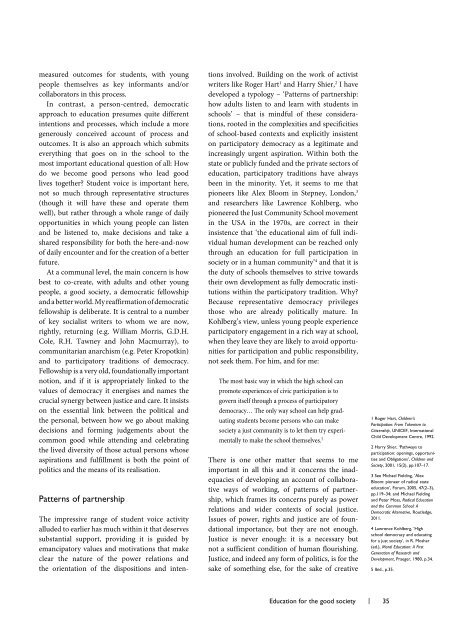EDUCATION FOR THE GOOD SOCIETY - Support
EDUCATION FOR THE GOOD SOCIETY - Support
EDUCATION FOR THE GOOD SOCIETY - Support
You also want an ePaper? Increase the reach of your titles
YUMPU automatically turns print PDFs into web optimized ePapers that Google loves.
measured outcomes for students, with youngpeople themselves as key informants and/orcollaborators in this process.In contrast, a person-centred, democraticapproach to education presumes quite differentintentions and processes, which include a moregenerously conceived account of process andoutcomes. It is also an approach which submitseverything that goes on in the school to themost important educational question of all: Howdo we become good persons who lead goodlives together? Student voice is important here,not so much through representative structures(though it will have these and operate themwell), but rather through a whole range of dailyopportunities in which young people can listenand be listened to, make decisions and take ashared responsibility for both the here-and-nowof daily encounter and for the creation of a betterfuture.At a communal level, the main concern is howbest to co-create, with adults and other youngpeople, a good society, a democratic fellowshipand a better world. My reaffirmation of democraticfellowship is deliberate. It is central to a numberof key socialist writers to whom we are now,rightly, returning (e.g. William Morris, G.D.H.Cole, R.H. Tawney and John Macmurray), tocommunitarian anarchism (e.g. Peter Kropotkin)and to participatory traditions of democracy.Fellowship is a very old, foundationally importantnotion, and if it is appropriately linked to thevalues of democracy it energises and names thecrucial synergy between justice and care. It insistson the essential link between the political andthe personal, between how we go about makingdecisions and forming judgements about thecommon good while attending and celebratingthe lived diversity of those actual persons whoseaspirations and fulfillment is both the point ofpolitics and the means of its realisation.Patterns of partnershipThe impressive range of student voice activityalluded to earlier has much within it that deservessubstantial support, providing it is guided byemancipatory values and motivations that makeclear the nature of the power relations andthe orientation of the dispositions and intentionsinvolved. Building on the work of activistwriters like Roger Hart 1 and Harry Shier, 2 I havedeveloped a typology – ‘Patterns of partnership:how adults listen to and learn with students inschools’ – that is mindful of these considerations,rooted in the complexities and specificitiesof school-based contexts and explicitly insistenton participatory democracy as a legitimate andincreasingly urgent aspiration. Within both thestate or publicly funded and the private sectors ofeducation, participatory traditions have alwaysbeen in the minority. Yet, it seems to me thatpioneers like Alex Bloom in Stepney, London, 3and researchers like Lawrence Kohlberg, whopioneered the Just Community School movementin the USA in the 1970s, are correct in theirinsistence that ‘the educational aim of full individualhuman development can be reached onlythrough an education for full participation insociety or in a human community’ 4 and that it isthe duty of schools themselves to strive towardstheir own development as fully democratic institutionswithin the participatory tradition. Why?Because representative democracy privilegesthose who are already politically mature. InKohlberg’s view, unless young people experienceparticipatory engagement in a rich way at school,when they leave they are likely to avoid opportunitiesfor participation and public responsibility,not seek them. For him, and for me:The most basic way in which the high school canpromote experiences of civic participation is togovern itself through a process of participatorydemocracy… The only way school can help graduatingstudents become persons who can makesociety a just community is to let them try experimentallyto make the school themselves. 5There is one other matter that seems to meimportant in all this and it concerns the inadequaciesof developing an account of collaborativeways of working, of patterns of partnership,which frames its concerns purely as powerrelations and wider contexts of social justice.Issues of power, rights and justice are of foundationalimportance, but they are not enough.Justice is never enough: it is a necessary butnot a sufficient condition of human flourishing.Justice, and indeed any form of politics, is for thesake of something else, for the sake of creative1 Roger Hart, Children’sParticipation: From Tokenism toCitizenship, UNICEF, InternationalChild Development Centre, 1992.2 Harry Shier, ‘Pathways toparticipation: openings, opportunitiesand Obligations’, Children andSociety, 2001, 15(2), pp.107–17.3 See Michael Fielding, ‘AlexBloom: pioneer of radical stateeducation’, Forum, 2005, 47(2–3),pp.119–34; and Michael Fieldingand Peter Moss, Radical Educationand the Common School: ADemocratic Alternative, Routledge,2011.4 Lawrence Kohlberg, ‘Highschool democracy and educatingfor a just society’, in R. Mosher(ed.), Moral Education: A FirstGeneration of Research andDevelopment, Praeger, 1980, p.34.5 Ibid., p.35.Education for the good society | 35





![[2012] UKUT 399 (TCC)](https://img.yumpu.com/51352289/1/184x260/2012-ukut-399-tcc.jpg?quality=85)





![Neutral Citation Number: [2009] EWHC 3198 (Ch) Case No: CH ...](https://img.yumpu.com/50120201/1/184x260/neutral-citation-number-2009-ewhc-3198-ch-case-no-ch-.jpg?quality=85)




